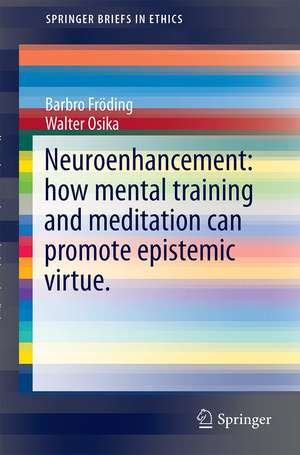Neuroenhancement: how mental training and meditation can promote epistemic virtue.: SpringerBriefs in Ethics
Autor Barbro Fröding, Walter Osikaen Limba Engleză Paperback – 11 sep 2015
Din seria SpringerBriefs in Ethics
-
 Preț: 84.28 lei
Preț: 84.28 lei -
 Preț: 377.18 lei
Preț: 377.18 lei -
 Preț: 343.13 lei
Preț: 343.13 lei -
 Preț: 353.67 lei
Preț: 353.67 lei -
 Preț: 377.18 lei
Preț: 377.18 lei -
 Preț: 408.44 lei
Preț: 408.44 lei -
 Preț: 474.84 lei
Preț: 474.84 lei -
 Preț: 343.21 lei
Preț: 343.21 lei -
 Preț: 378.71 lei
Preț: 378.71 lei -
 Preț: 410.77 lei
Preț: 410.77 lei -
 Preț: 377.95 lei
Preț: 377.95 lei - 15%
 Preț: 461.87 lei
Preț: 461.87 lei -
 Preț: 414.72 lei
Preț: 414.72 lei -
 Preț: 478.53 lei
Preț: 478.53 lei - 15%
 Preț: 461.73 lei
Preț: 461.73 lei -
 Preț: 377.95 lei
Preț: 377.95 lei -
 Preț: 376.80 lei
Preț: 376.80 lei -
 Preț: 377.95 lei
Preț: 377.95 lei -
 Preț: 477.34 lei
Preț: 477.34 lei -
 Preț: 350.81 lei
Preț: 350.81 lei -
 Preț: 377.95 lei
Preț: 377.95 lei -
 Preț: 174.24 lei
Preț: 174.24 lei -
 Preț: 477.17 lei
Preț: 477.17 lei -
 Preț: 476.57 lei
Preț: 476.57 lei -
 Preț: 476.79 lei
Preț: 476.79 lei -
 Preț: 478.71 lei
Preț: 478.71 lei -
 Preț: 174.83 lei
Preț: 174.83 lei -
 Preț: 259.41 lei
Preț: 259.41 lei -
 Preț: 259.57 lei
Preț: 259.57 lei -
 Preț: 408.44 lei
Preț: 408.44 lei -
 Preț: 259.19 lei
Preț: 259.19 lei -
 Preț: 410.55 lei
Preț: 410.55 lei - 15%
 Preț: 463.03 lei
Preț: 463.03 lei -
 Preț: 411.16 lei
Preț: 411.16 lei - 15%
 Preț: 463.03 lei
Preț: 463.03 lei -
 Preț: 475.06 lei
Preț: 475.06 lei -
 Preț: 374.08 lei
Preț: 374.08 lei -
 Preț: 408.82 lei
Preț: 408.82 lei -
 Preț: 375.45 lei
Preț: 375.45 lei
Preț: 378.34 lei
Nou
Puncte Express: 568
Preț estimativ în valută:
72.40€ • 78.62$ • 60.82£
72.40€ • 78.62$ • 60.82£
Carte tipărită la comandă
Livrare economică 22 aprilie-06 mai
Preluare comenzi: 021 569.72.76
Specificații
ISBN-13: 9783319235165
ISBN-10: 3319235168
Pagini: 120
Ilustrații: XI, 110 p.
Dimensiuni: 155 x 235 x 12 mm
Greutate: 0.19 kg
Ediția:1st ed. 2015
Editura: Springer International Publishing
Colecția Springer
Seria SpringerBriefs in Ethics
Locul publicării:Cham, Switzerland
ISBN-10: 3319235168
Pagini: 120
Ilustrații: XI, 110 p.
Dimensiuni: 155 x 235 x 12 mm
Greutate: 0.19 kg
Ediția:1st ed. 2015
Editura: Springer International Publishing
Colecția Springer
Seria SpringerBriefs in Ethics
Locul publicării:Cham, Switzerland
Public țintă
ResearchCuprins
CHAPTER 1 – Introduction.- 1.1 Introduction .- 1.2 A new situation.- 1.3 From bad to worse .- 1.4 How to handle matters better: skills required to manage risks.- 1.5 Can we acquire the skills?.- 1.6 Enhancement methods.- 1.7 Which cognitive capacities?.- References.- CHAPTER 2 – The neurophysiological background .- 2.1 Introduction.- 2.2 Neuroplasticity.- 2.3 Attention.- 2.4 Mind-wandering.- 2.5 Emotional regulation.- 2.6 Mental training –meditation.- 2.7 Some challenges with meditation practice and research .- References.- CHAPTER 3 – The Methods .- 3.1 How to improve.- 3.2 Defining cognitive enhancement.- 3.3 Three methods .- 3.4 Pharmaceuticals, hormones and neurotransmitters.- 3.5 Technology.- 3.6 Possible effects of meditation techniques and mental training.- 3.7 Computer games.- Combining methods.- References.- CHAPTER 4 – Cognitive flexibility.- 4.1 How does cognitive flexibility relate to meditation?.- 4.2 Cognitive flexibility
4.3 Why is it good to be more cognitively flexible?.- 4.4 Improved cognitive flexibility can translate to better decision-making.- 4.5 Smarter but not nicer.- 4.6. Summary.- References.- CHAPTER 5 –Some key elements of virtue ethics.- Part A: A brief introduction to virtue ethics .- 5.1. Introduction.- 5.2 A suitable moral framework.- 5.3 The beginnings of virtue ethics.- 5.4 What is the virtuous life and
what is so good about it?.- 5.5 In summary.- Part B: From meditation to the good life.- 5.6 Training for virtue.- 5.7 Creating moral experts.- 5.8 Enhancement as an enabler .- 5.9 Enhancement as a way to increase commitment .- 5.10 Helpful but not enough .- 5.11 The role of epistemic virtues.- 5.12 Some modern or new epistemic virtues that might be useful.- 5.12 From core capacities to functional change and decision-making .- 5.13 Commonalities and compatibility .- 5.14 Conclusion.- References.- CHAPTER 6 – Conclusions.- 6.1 Summary.- 6.2 Combinations.- 6.3 Moral enhancement – different takes.- 6.4 The role of embedding structures .- 6.5 Concluding remarks.- References.
4.3 Why is it good to be more cognitively flexible?.- 4.4 Improved cognitive flexibility can translate to better decision-making.- 4.5 Smarter but not nicer.- 4.6. Summary.- References.- CHAPTER 5 –Some key elements of virtue ethics.- Part A: A brief introduction to virtue ethics .- 5.1. Introduction.- 5.2 A suitable moral framework.- 5.3 The beginnings of virtue ethics.- 5.4 What is the virtuous life and
what is so good about it?.- 5.5 In summary.- Part B: From meditation to the good life.- 5.6 Training for virtue.- 5.7 Creating moral experts.- 5.8 Enhancement as an enabler .- 5.9 Enhancement as a way to increase commitment .- 5.10 Helpful but not enough .- 5.11 The role of epistemic virtues.- 5.12 Some modern or new epistemic virtues that might be useful.- 5.12 From core capacities to functional change and decision-making .- 5.13 Commonalities and compatibility .- 5.14 Conclusion.- References.- CHAPTER 6 – Conclusions.- 6.1 Summary.- 6.2 Combinations.- 6.3 Moral enhancement – different takes.- 6.4 The role of embedding structures .- 6.5 Concluding remarks.- References.
Textul de pe ultima copertă
This book explores how one can bring about changes in the brain through meditation, both through attention-focus training and through compassion training. Recent findings in the natural sciences have confirmed that it is possible for humans to achieve these structural and functional changes through various life-style practices. It is argued that meditation enables us to influence some aspects of our biological make-up and, for example, could boost our cognitive flexibility as well as our ability to act compassionate. Such changes are likely to facilitate the instilling of a number of epistemic virtues which have great bearing on our quality of life. This book offers the reader an accessible introduction to a set of neuro-enhancement methods, with a special focus on meditation techniques, and explores how such practices could contribute to make us better decision-makers and improve our moral virtues. The book is suitable for anyone looking for a text discussing the effects of neuro-enhancement from a secular ethics perspective.
Caracteristici
Discusses the potential, and the positive effects, of regular meditation both from the perspective of the individual and the broader society suggesting that it could help promote a more ethical social climate Offers a fresh take by connecting meditation to both improved cognitive flexibility and more responsible decision-making Takes a truly inter-disciplinary approach, which explores both the neurological and the ethical and philosophical dimensions of meditation Written from a secular ethics point of view, making it suitable for large group of readers, including both lay-people and academics from various disciplines Includes supplementary material: sn.pub/extras












